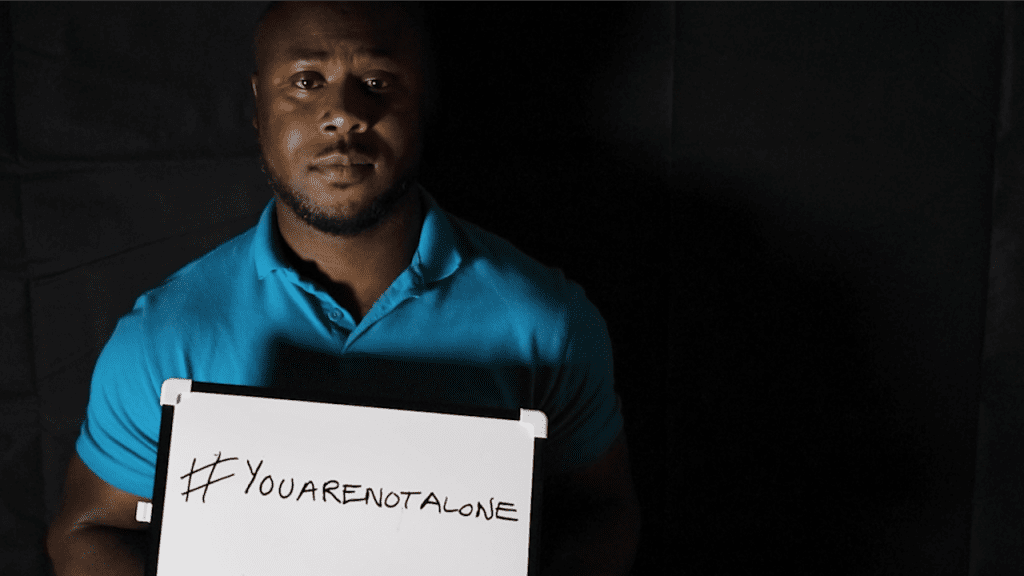Oxfordshire man Erochsia Joseph has spoken out about his experiences of depression and feeling suicidal ahead of World Suicide Prevention Day (10 September 2019).
The 37-year-old plasterer has talked about feeling isolated and what helped him through his darkest times. Erochsia is now encouraging other men to speak out and get help at a time when suicide is on the increase – particularly among men.
Official statistics published last week show that the suicide rate went up significantly last year in England and Wales for the first time since 2013, with men representing three quarters of the total.
Suicide rates in Oxfordshire are slightly lower than the national England average. Between 2016 and 2018 there were a total of 155 deaths by suicide in Oxfordshire. Of these, 126 were men, which means that that deaths in men outnumbered those in women by more than four to one.
Determination to reduce suicides
In Oxfordshire there is a determination to reduce the number of deaths by suicide. The Oxfordshire Suicide Prevention Multi-Agency Group formed in 2014 and brings together public, private and charity sector organisations, all of whom are committed to suicide prevention.
The Oxfordshire suicide prevention group is about to revise its action plan and develop a strategy and wants to hear from people in Oxfordshire who have been affected by suicide or who may have had suicidal thoughts themselves. They are asking residents to complete the www.oxfordshire.gov.uk/suicidepreventionsurvey to help achieve this understanding.
Touching whole communities
The effects of suicide can touch whole communities and the impact on families, friends, colleagues and others can be devastating. People bereaved by suicide can experience mental and physical ill health as a result of their loss, with some going on to experience suicidal thoughts themselves.
“When I was younger no-one spoke about their feelings and definitely wouldn’t admit to feeling depressed, so I never spoke about it I just kept it all in, bottled up,” Erochsia said.
“As I got older I realised I wasn’t the only person that felt like this. A close friend of mine, who I used to play football with, recently died by suicide and it has had a massive impact on the community, this is the main reason I am speaking out to share my experiences but also to encourage people to talk to someone and don’t keep it bottled up. To get better you must get these feelings out and speak to someone before it gets really bad.”
The strategy and action plan will contribute to the reduction of suicides and will be informed by research and national guidance as well as local intelligence, such as circumstances and risk factors, so that prevention approaches can be better targeted. Self-harm, defined as intentional self-poisoning or self-injury, can be a risk factor of suicide; however, not all people who self-harm or die by suicide. Therefore, the multi-agency group want to include self-harm prevention as part of the strategy and action plan.
Examples of work from this group include:
- Monitoring local suicide data in real time to highlight any emerging trends, risk factors and high-risk groups, offering rapid signposting to sources of support and to targeting the work of the multi-agency suicide prevention group
- Training to GP practices following the death of a patient so they can support family members and feel more skilled in spotting the signs
- Oxfordshire County Council trained 70 mental wellbeing champions who can spot the signs of mental distress and open up supportive conversations
- PHE/NHSE online suicide awareness training disseminated across Oxfordshire professional networks to better equip front line staff in spotting the signs of suicide and self-harm
- Suicide awareness training for security staff at Westgate shopping centre, which has been delivered by Oxford Samaritans
- 2019 saw the fourth year of ‘Under my Skin’ play performed by Pegasus Theatre across Oxfordshire secondary schools to Year 8 and 9 pupils, highlighting the risks of self-harm, and how to access support locally.
- Promoting local support services such as Samaritans, Oxford Cruse and the Oxford Safe Haven via targeted campaigns in specific areas of the county when there has been a number of deaths in one area,
As part of the developing the new action plan, the prevention group is looking at ways to encourage self-help groups, particularly for men, that have proved successful in other parts of England.
Finding out what residents think
That’s why the multi-agency group wants to find out what Oxfordshire residents think might help make Oxfordshire safer for people at risk of community suicide and better able to support the family and friends of people who do take their own life.
Hearing from local people, particularly those with experience of suicide or self-harm, is very important to help gain a better understanding of what might help to reduce suicide across the county. The multi-agency group is asking residents to complete the survey www.oxfordshire.gov.uk/suicidepreventionsurvey to help achieve this understanding.
Professor Keith Hawton, Director of Oxford University Centre for Suicide Research and a member of the multi-agency, said:
“A major part of effective prevention of suicide and self-harm involves local initiatives that embrace the whole community. To do this successfully the members of the MAG need to know what local people think will be most helpful. I therefore urge readers who feel that they have something to contribute to complete the survey so that they can help shape local policy for prevention of suicide and self-harm. “
‘I knew something was wrong but didn’t know what it was. I felt in a dark place.’
Erochsia knew something was wrong when he felt like he couldn’t be bothered to socialise or engage.
He explained: “I had no motivation, I had lost my appetite and no love for the activities and things I usually enjoyed, I felt in a really dark place. I knew something was wrong, but I didn’t know what.”
“I had been feeling this way for a while, but it was getting worse. I was working a lot and had been burning the candle at both ends, I felt exhausted.”
“I knew I had to speak to someone as I didn’t know why I felt like this, but something was wrong, and I didn’t want to feel this way.”
“I eventually spoke to a couple of people that were older than me, people that I trusted. They signposted me to various places including Talking Space[s] and suggested talking to my GP.”
When Erochsia got professional help, he was diagnosed with depression and started talking therapy with Talking Space, a free local service for people experiencing depression or anxiety in Oxfordshire. With support from friends, family and local services Erochsia has started the journey to getting better.
When things started to turn around for Erochsia
“The point where things got better was when I really started talking to people and wasn’t ashamed of how I felt. Thirteen months on and I do feel better, I still have bad days and I still have a lot to work on, but I know who I can talk to if I feel like this.”
The Manchester United fan, who is a self-employed plasterer and has lived in Oxford all of his life, talks about what helps him on a day-to-day basis.
“I would say the one thing that helped me the most is when someone introduced me to fishing. At first, I really wasn’t interested but then I gave it a go and it was an amazing experience.”
“Being around nature is incredible. When you’re outside and you can hear the birds tweeting, the trees rustling and the water lapping from the boats, it is the most relaxing experience. It’s like all my problems disappear when I am in that moment and nothing else matters.”
“Staying inside within four walls is the worst thing you can do, it will make you feel claustrophobic and make everything feel worse.”
Lawrie Stratford, Cabinet Member for public health said: “We are pleased to be working with our partners on suicide prevention. Oxfordshire residents’ views are vital in shaping the work that we do to support suicide and self-harm prevention locally, and we want to encourage as many people as possible to complete the survey to make this possible.
Help is at hand
If you need help with issues relating to suicide please call the Samaritans 116 123 or go to www.oxfordshire.gov.uk/suicideprevention
Those bereaved as the result of a suicide can find help and advice through the Help is at Hand booklet here.


